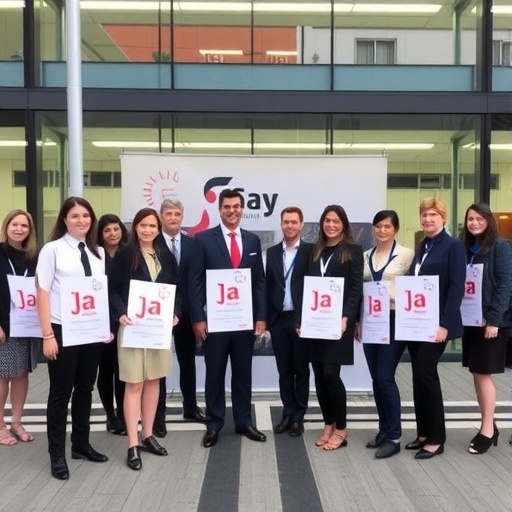In a remarkable demonstration of collaborative effort within the European academic landscape, three of Germany’s foremost business schools—ESMT Berlin, Mannheim Business School, and WHU – Otto Beisheim School of Management—have embarked on a groundbreaking initiative designed to amplify Germany’s prominence as an international hub for science and education. This strategic alliance, titled “Say JA to Germany,” addresses a timely need to spotlight the country’s advantages amidst a global climate increasingly characterized by political and social volatility.
The underlying rationale for this cooperation is anchored in Germany’s enduring reputation for political stability, democratic governance, and an intellectual culture that prizes open discourse—qualities that stand in stark contrast to the uncertainties institutionalized in other parts of the world. Each institution, renowned for academic rigor melded with real-world relevance, brings its esteemed international standing and expertise to the table, crafting a unified voice that underscores Germany’s unique appeal as a destination for students, researchers, and thought leaders.
ESMT Berlin, with its cutting-edge research outputs and robust industry connections, epitomizes the nexus between academic excellence and practical innovation. Similarly, Mannheim Business School and WHU contribute their distinctive strengths in nurturing entrepreneurial and management acumen, which have consistently propelled them into the upper echelons of European business education. Their concerted focus on internationalization enables them to cultivate a diverse ecosystem that thrives on cross-cultural interaction and intellectual exchange.
“Say JA to Germany” is more than a promotional campaign; it is a meticulously coordinated external communication strategy that leverages the schools’ collective power to penetrate global markets and public consciousness. Central to this strategy are joint public relations efforts and media engagements targeting both national and international outlets, aimed at disseminating compelling narratives about Germany’s educational landscape and research environments, thus inspiring academic mobility on a global scale.
Furthermore, the initiative introduces a synergetic social media campaign designed to harness the persuasive influence of testimonials from a broad spectrum of alumni, current students, and faculty members. These personal accounts provide authentic insights into the lived experiences within Germany’s academic institutions, showcasing the cultural adaptability, professional opportunities, and academic freedom available to international scholars.
According to Jörg Rocholl, president of ESMT Berlin, Germany’s educational ecosystem excels in delivering quality education through English-language programs, which significantly lowers the barriers for international students. More importantly, Germany’s societal and institutional framework offers predictability and clarity in career development pathways, critical considerations for those enrolling in higher education amid global uncertainties.
Christian Andres, dean of WHU, emphasizes the profound responsibility that academic institutions bear: to forge intellectual spaces where examination, skepticism, and intercultural understanding flourish unabated. This initiative becomes a beacon of such values in an era increasingly marked by geopolitical and social fragmentation, underscoring the role of academia as a safeguard of intellectual integrity and a promoter of enduring dialogue.
Embedded in the cooperative framework are comprehensive advantages that Germany extends to international students, including cost-efficient tuition models that do not compromise academic quality. The stability embedded in Germany’s legal and institutional education frameworks offers reliable pathways from study to employment, concurrently securing everyday conveniences and protections vital for student wellbeing and success.
Mannheim Business School’s dean and president, Joachim Lutz, articulates the symbolic significance of the alliance, highlighting a resolute commitment to cultivating an educational environment where excellence, openness, and expansive opportunities are accessible to a global student audience. Their message is one of welcome and encouragement, positioning Germany as a nurturing academic home for those aspiring to contribute globally in business and science.
A notable feature of the alliance is its potential to influence international education fairs and forums, where collaborative booths and joint presentations will elevate Germany’s profile and foster sustained engagement with prospective students and academic partners worldwide. This synchronized representation ensures that prospective candidates receive coherent, persuasive information that enhances enrollment decisions.
In addition to outreach activities, the initiative pledges to fortify academic freedom—a cornerstone of German higher education—ensuring that students and researchers operate in environments that encourage inquiry without undue restriction. This commitment aligns with broader democratic principles and underscores the inherent link between liberty and innovation in scientific and academic endeavors.
As global challenges mount, from economic disruptions to socio-political unrest, the “Say JA to Germany” initiative stands out as a proactive endeavor to reaffirm and rejuvenate Germany’s attractiveness as a bastion of intellectual opportunity and societal stability. It articulates a clear, unified narrative that the three institutions hope will resonate worldwide, encouraging a new generation of global leaders and innovators to choose Germany as their academic destination.
Ultimately, this collaboration between premier German business schools not only enhances their collective branding but also strengthens the international higher education sector by promoting values fundamental to academic excellence and global cooperation. Through shared vision and concerted action, ESMT Berlin, Mannheim Business School, and WHU are pioneering a model for strategic alliances that navigate and shape the future of international education.
Subject of Research: Not specified
Article Title: Not specified
News Publication Date: Not specified
Web References:
- ESMT Berlin: https://esmt.berlin/
- Mannheim Business School: https://www.mannheim-business-school.com/en/
- WHU – Otto Beisheim School of Management: https://www.whu.edu/en/
References: Not provided
Image Credits: ESMT Berlin, Mannheim Business School, WHU – Otto Beisheim School of Management
Keywords: Economics, Business




